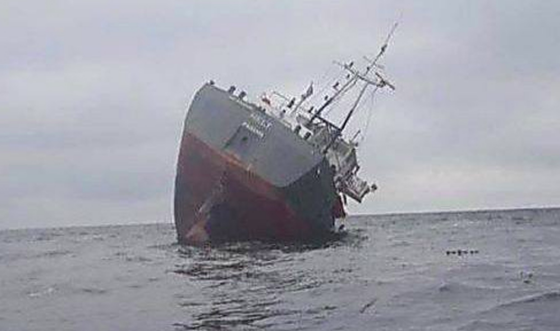
Les craintes grandissent pour tous les marins pris dans l'agression russe

Le Merchant Navy Welfare Board (MNWB) a lancé un fonds d'urgence pour carte SIM de 5 000 £ pour garantir que les marins ukrainiens puissent contacter leurs proches à la maison, tandis que les estimations suggèrent qu'il y a plus de 2 000 marins d'autres nationalités bloqués dans les eaux ukrainiennes.
Les dernières données de la plate-forme maritime Sea montrent qu'il y a encore 100 navires marchands dans les eaux ukrainiennes, en baisse de plus de 50% depuis le début du conflit il y a 12 jours, selon Splash et les ambassades et consulats travaillent 24 heures sur 24 pour faire sortir l'équipage affecté du de campagne.
Le fonds d'aide aux marins ukrainiens, formé par l'association caritative pour la marine marchande britannique et les flottes de pêche, couvrira le coût des cartes SIM et des recharges, alors que l'invasion de l'Ukraine par la Russie s'intensifie.
Les organismes de bienfaisance du secteur maritime qui fournissent une aide sociale aux gens de mer et aux pêcheurs peuvent demander des subventions d'un maximum de 250 £ pour garantir une répartition équitable de l'argent.
On estime qu'il y a environ 75 000 marins ukrainiens à travers le monde, à plusieurs milliers de kilomètres de leurs familles.
Stuart Rivers, directeur général de l' organisation caritative , a déclaré : « Certaines des histoires que nous avons entendues de la part de marins ukrainiens sont absolument déchirantes. Beaucoup ont vu leurs maisons détruites et leurs familles fuir vers des endroits inconnus – et la situation ne fait qu'empirer.
« Mettre en place ce fonds est le moins que nous puissions faire pendant cette crise. Espérons que les appels téléphoniques passés par les marins, qui pourraient se trouver à des milliers de kilomètres de chez eux, offriront une sorte de réconfort. Leur bien-être et celui de leurs familles sont de la plus haute importance et nous travaillerons en étroite collaboration avec nos organisations caritatives constituantes pour offrir le plus de soutien possible. »
Yachts for Ukraine agit pour saisir les biens détenus par les élites russes – y compris les yachts
Selon Business Insider, les législateurs américains tentent de présenter un nouveau projet de loi qui saisirait les yachts et les actifs des élites russes, intensifiant encore les sanctions économiques américaines contre la Russie dans le cadre de son invasion de l'Ukraine.
La loi Yachts for Ukraine permettrait aux autorités de saisir toute propriété détenue par les élites russes aux États-Unis d'une valeur supérieure à 5 millions de dollars. Cela inclut les comptes bancaires, l'immobilier et les superyachts.
Le projet de loi, qui est dirigé par le représentant démocrate Tom Malinowski du New Jersey et le représentant républicain Joe Wilson de Caroline du Sud, permettrait également aux États-Unis de vendre les actifs saisis et d'utiliser l'argent pour aider l'Ukraine. L'autorité fournie par le projet de loi durerait deux ans après son adoption, donnant au président Joe Biden un pouvoir prolongé sur les oligarques russes garant leur richesse aux États-Unis.
Ces yachts appartenant à des Russes doivent se trouver dans les eaux territoriales américaines pour que les États-Unis puissent les saisir, explique Benjamin Maltby, associé chez Keystone Law, basé au Royaume-Uni, spécialisé dans le droit des superyachts et des actifs de luxe. "Les espaces sûrs vont être rares", déclare Maltby. Il pense que les petites nations insulaires, comme les Maldives, ne voudront peut-être pas être vues en collusion avec les oligarques russes pour faire échec aux sanctions et pourraient choisir de prendre des mesures à la suite des sanctions américaines.
Un adolescent surveille les superyachts russes
L'adolescent traquant les jets des oligarques russes vise désormais leurs superyachts, selon le Wall Street Journal .
Jack Sweeney a créé samedi @RussiaYachts, un bot Twitter qui surveille et publie les allées et venues sur l'eau des Russes super riches.
"Je n'arrêtais pas de recevoir de plus en plus de personnes dans mes messages directs disant:" Pouvez-vous faire les yachts aussi? Alors, je l'ai fait », dit Sweeney.
Surveiller ces yachts russes pic.twitter.com/BaZQeNyyKB
— Yachts russes (@RussiaYachts)el="nofollow">6 mars 2022
Son compte @RussiaYachts suit les mouvements de 23 bateaux de luxe, dont certains appartiennent aux mêmes milliardaires russes que Sweeney suit dans les airs chez @RUOliarchJets.
Les robots de suivi des jets de Sweeney s'appuient sur les données publiques des transpondeurs d'avion qui enregistrent la longitude, la latitude et l'altitude et calculent l'emplacement en fonction d'un algorithme qu'il a créé en 2020. Pour les yachts, il s'appuie sur des données similaires provenant de dispositifs de sécurité embarqués qui transmettent et surveillent le emplacements des grands navires.
Sweeney dit qu'une chose est plus simple à propos du suivi des yachts au-dessus des avions : il est beaucoup plus facile de déterminer quel oligarque possède quel bateau.
Forbes a publié sa liste des superyachts en ligne de mire et où les trouver.
Le responsable des superyachts de VesselsValue, Sam Tucker, a déclaré à Forbes que "la propriété d'un yacht est notoirement privée". La firme a confiance à 90% dans ses données sur ces yachts, qui sont généralement détenus par des sociétés offshore enregistrées partout de l'île de Man aux îles Caïmans. Collectivement, les 36 yachts sur les listes de Forbes valent au moins 4 milliards de dollars. Les huit yachts appartenant à des milliardaires russes sanctionnés valent près d'un milliard de dollars.
"Techniquement parlant, ces yachts appartiennent à un véhicule à usage spécial, se trouvant souvent dans une juridiction différente de celle du bénéficiaire effectif", déclare Tucker. "Il existe également des systèmes de location, qui éloignent davantage le [propriétaire] de l'actif." Les systèmes de location sont des structures juridiques couramment utilisées pour acheter des yachts, permettant aux particuliers de posséder un yacht par le biais d'une société distincte - souvent enregistrée dans des endroits comme Malte et Chypre - qui loue ensuite le yacht à l'individu.
Navires de commerce touchés par des projectiles
De nombreuses compagnies maritimes ont suspendu leurs voyages vers les ports de la mer Noire et d'autres terminaux en Ukraine au milieu de l'augmentation récente des primes d'assurance pour ces voyages. Au moins trois navires commerciaux ont été touchés séparément par des projectiles depuis le 24 février, date du début de l'invasion russe.
Viktor Vyshnov, chef adjoint de l'administration maritime ukrainienne, a déclaré à Reuters que six membres d'équipage du Helt battant pavillon des Îles Marshall (qui a coulé plus tard) ont été récupérés par les services de secours ukrainiens et emmenés dans un hôpital à proximité de Tchernomorsk après avoir flotté dans l'eau froide pendant plusieurs heures. , mais il n'avait pas plus de détails.
Le sauvetage a été confirmé par Igor Ilves, directeur général de l'agence de navigation Helt's Tallinn, Vista Shipping Agency.
Tard mercredi, un missile ou une bombe a frappé un cargo bangladais dans le port d'Olvia sur la mer Noire, tuant l'un de ses membres d'équipage.
"Le navire a été attaqué et un ingénieur a été tué", a déclaré à Reuters Pijush Dutta, directeur exécutif de Bangladesh Shipping Corp. "Il n'était pas clair s'il s'agissait d'une bombe ou d'un missile ou de quel côté avait lancé l'attaque. Les 28 autres membres d'équipage sont indemnes.

La semaine dernière, Marine Industry News a rapporté comment la Chambre internationale de la marine marchande (ICS), la principale association commerciale internationale de l'industrie du transport maritime, a exhorté les armateurs à s'assurer que les gens de mer ne deviennent pas des "dommages collatéraux" des sanctions russes après l'invasion de l'Ukraine.
